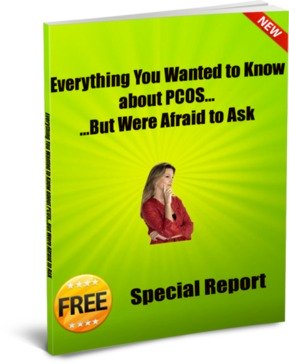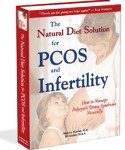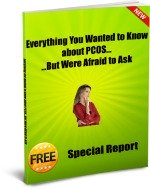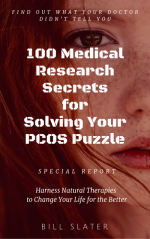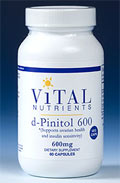PCOS Review Newsletter #60
1) Too Much Homocysteine Can Shrink Your Brain
1) Too Much Homocysteine Can Shrink Your Brain
If you have PCOS, you're likely to have higher homocysteine levels than other women. So we hope you take the time to read this article. It's a little long-winded, but your brain will thank you.
At the risk of repeating ourselves, we've said frequently in past newsletters that polycystic ovarian syndrome is not a disorder only within your ovaries. We've also said that metformin or birth control pills alone may not solve your problems. We repeat that you're dealing with a systemic disorder that requires a comprehensive approach. Take your brain for example.
It appears that the metabolic disarray of PCOS may contribute to brain problems. A few months ago we mentioned that we had heard some information about a possible link between Alzheimer's and PCOS, although we hadn't seen any studies about it.
However, a new medical study from the Boston University School of Medicine has come to our attention. The study included an analysis by magnetic resonance imaging (MRI) of the brains of 1,050 women. Those with the highest blood levels of homocysteine had a smaller brain volume accompanied by increased rate of "silent brain infarct" and other brain damage.
This study confirmed an earlier study, which concluded: "The overall risk of having either a silent brain infarct or severe white matter lesions was strongly associated with total homocysteine levels We concluded that total homocysteine levels are associated with silent brain infarcts and white [brain] matter lesions independent of other cardiovascular risk factors."
Silent infarct of the brain is a result of obstruction of small blood vessels which cuts off oxygen to tissues, resulting in tissue damage. Infarct may give rise to symptoms such as headache, or cognitive, motor or other malfunction -- or possibly no symptoms at all.
OK, let's get back to homocysteine. What is it and what can you do about it?
Homocysteine is a chemical compound that is part of your normal metabolic processes. If your metabolism is healthy, it is converted into other compounds. However, if homocysteine accumulates, it becomes toxic to the body. It is a known risk factor for heart disease and has been linked to dementia, stroke and increased bone fractures in later years.
The problem is that women with polycystic ovary syndrome have been shown to have higher levels of homocysteine than healthier women. It's highly unlikely your doctor has tested your homocysteine levels so it's impossible to know what your risk might be.
However, there are several things you can do to keep it under control.
1) Take supplemental B vitamins, especially B6, folic acid, and B12. These vitamins in particular greatly help you to control homocysteine levels.
2) Supplemental NAC, an amino acid, is also suggested. A recent study has shown that it reduces homocysteine levels, especially when combine with folic acid, which is a B-vitamin. NAC may also be useful for reducing insulin resistance and improving fertility of Clomid-resistant women.
3) Get more exercise. The University of Warwick in the UK conducted a study of overweight PCOS women. One group was given a 6-month exercise program, the other group was not. The exercise group reduced their homocysteine. The non-exercisers did not. The researchers concluded: "Our study has provided the first evidence that regular exercise significantly lowers plasma homocysteine in young overweight or obese women with PCOS, a group at increased risk of premature atherosclerosis."
4) If you're taking metformin, be especially alert. Although there is some conflicting evidence, it appears that metformin is likely to cause an increase in homocysteine. For example, in a study from Baskent University in Turkey, a group of women with PCOS who took metformin by itself for 3 months had a 26% increase in homocysteine. However, another group taking a B-complex vitamin with metformin had a 21% decrease in homocysteine and a third group taking only folic acid had a 8% reduction. The moral of the story is this: if you're taking metformin, you also should at least take a high-quality B-complex vitamin.
In a future issue, we'll talk about homocysteine and how it causes problems if you are pregnant. If you are trying to conceive or are already pregnant, Wellness Essentials for Pregnancy is recommended. Not only does it have vital nutrients for your developing baby, but it has a good supply of B-complex vitamins to help you control homocysteine.
Sources:
de la Calle M et al Increased homocysteine levels in polycystic ovary syndrome, Med Clin (Barc). 2007 Sep 8;129(8):292-4
Seshadri S et al Association of plasma total homocysteine levels with subclinical brain injury: cerebral volumes, white matter hyperintensity, and silent brain infarcts at volumetric magnetic resonance imaging in the Framingham Offspring Study, Arch Neurol, 2008; 65(5): 642-9
Vermeer Sarah E et al Homocysteine, silent brain infarcts, and white matter lesions: The Rotterdam Scan Study, Annals of Neurology. 2002, vol. 51, no3, pp. 285-289 (29 ref.)
Kilicdag EB et al Administration of B-group vitamins reduces circulating homocysteine in polycystic ovarian syndrome patients treated with metformin: a randomized trial, Hum Reprod. 2005 Jun;20(6):1521-8. Epub 2005 Mar 24
Yilmaz H et al Effects of folic acid and N-acetylcysteine on plasma homocysteine levels and endothelial function in patients with coronary artery disease, Acta Cardiol, 2007; 62(6): 579-85
3) Read More, Live Longer
We know it takes time and effort to read our newsletters. The topics can be pretty technical at times. In this issue for example, you probably were told more about homocysteine than you ever wanted to know.
So why should you bother?
First of all, these newsletters give you information and analysis that you cannot get anywhere else. The information will help you to better understand and manage PCOS and all its related health problems.
But there's another reason, according to the Feinberg School of Medicine at Northwestern University. Researchers there have discovered that people with the best "health literacy" actually live longer.
They conclude that "Inadequate health literacy, as measured by reading fluency, independently predicts all-cause mortality and cardiovascular death "
Although the study focused on older people, the principle applies to anyone. The more you read and the more you inform yourself about health issues, the longer you are likely to live.
Sources:
Baker DW et al, Health literacy and mortality among elderly persons, Arch Intern Med. 2007 Jul 23;167(14):1503-9
Thought for Today: "Thousands of candles can be lighted from a single candle, and the life of the candle will not be shortened. Happiness never decreases by being shared." -- Buddha
PCOS Health Review
This free newsletter gives you original and immediately usable information to help you deal with PCOS.
Get the latest research, tips for improving your health, answers to questions, success stories, and more!
Your e-mail address is totally secure. We will never misuse your information.
Enter Your Email Above to Subscribe Today
and Get Your Questions Answered in this Free Special Report!
